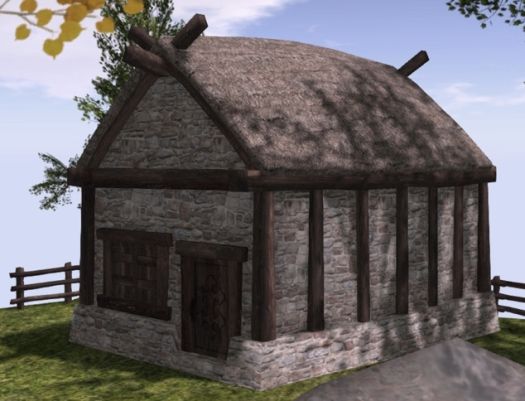Difference between revisions of "Storehouse"
Tao alexis (talk | contribs) |
Tao alexis (talk | contribs) |
||
| Line 1: | Line 1: | ||
[[File:Storehouse.jpg|right|525px|thumb|An uncommon fully stone storehouse.]] | [[File:Storehouse.jpg|right|525px|thumb|An uncommon fully stone storehouse.]] | ||
| − | '''Storehouses''' are | + | '''Storehouses''' are compact yet robust structures designed for the preservation of essential supplies, to be accessed when the need arises, whether for maintenance purposes or during a crisis. Empty water barrels are commonly stored in such places in readiness for times of water scarcity. Additionally storehouses may be stocked with tools and equipment for the replacement of damaged items or the repair of other buildings. |
| + | __TOC__ | ||
| + | The term "stores" is distinct from "[[Warehouse|wares]]," which are objects stored for sale to the public. Stores more correctly include materials such as planks, mortar, canvas, heavy labor tools, baskets, sacks and, in the context of [[Dockyard|dockyards]] and [[Wharf|wharves]], materials such as rope, nets, sailcloth, pitch and more. Sand is often stored as a preventive measure against fires or to combat icy conditions during winter. [[Military Post|Military posts]] employ [[Armoury|armouries]] to store arms, but an army requires many other sorts of hard goods as well. | ||
| + | |||
| + | |||
| − | |||
== Construction == | == Construction == | ||
Revision as of 18:52, 25 October 2023
Storehouses are compact yet robust structures designed for the preservation of essential supplies, to be accessed when the need arises, whether for maintenance purposes or during a crisis. Empty water barrels are commonly stored in such places in readiness for times of water scarcity. Additionally storehouses may be stocked with tools and equipment for the replacement of damaged items or the repair of other buildings.
Contents
The term "stores" is distinct from "wares," which are objects stored for sale to the public. Stores more correctly include materials such as planks, mortar, canvas, heavy labor tools, baskets, sacks and, in the context of dockyards and wharves, materials such as rope, nets, sailcloth, pitch and more. Sand is often stored as a preventive measure against fires or to combat icy conditions during winter. Military posts employ armouries to store arms, but an army requires many other sorts of hard goods as well.
Construction
Storehouses tend to be small and narrow, typically 12 by 20 ft., though they may be longer in provide stores like support timbers for buildings or ship masts. They're built without windows, without soffiting. A single storehouse may serve a small guildhouse or a carter post, while dozens of storehouses may support a military post or wharf. If there are multiple storehouses, each will have specific requirements, that may effect their construction.
Total core materials for a 12 by 20 ft. storehouse are 192 cub.ft. broken stone, 64 cub.ft. mortar and 288 board ft. Cost varies according to location, but a reliable guess for the building shell would be 146 g.p.
Most storehouses are half-timbered, with a six-foot high wall of mortared broken stone and timber-framed rafters and roof. Stone walls are minimally 6 inches thick. Fire is a dangerous risk to storehouses; pitch mixed with sand can provide fire-protection, but the use of green wood for roofs, replaced seasonally, serves also. Giant waterbarrels are sometimes located beside storehouses in case of fire.
Protection
Storehouses aren't locked or, most of the time, even guarded. Most items that are stored would have little value and would be difficult to unload as stolen goods. Moreover, depots or docksides with storehouses are busy in some kind of service day and night, so that local dockworkers and gangers (supervisors) would be apt to notice an open door or the presence of a vehicle large enough to carry enough stores away to matter. It commonly takes time to find specific items amidst the tangle of things stored there, especially in the semi-dark and without prior knowledge.
See also,
Hammer (symbol)
The Adventure
Type-7 Hex
